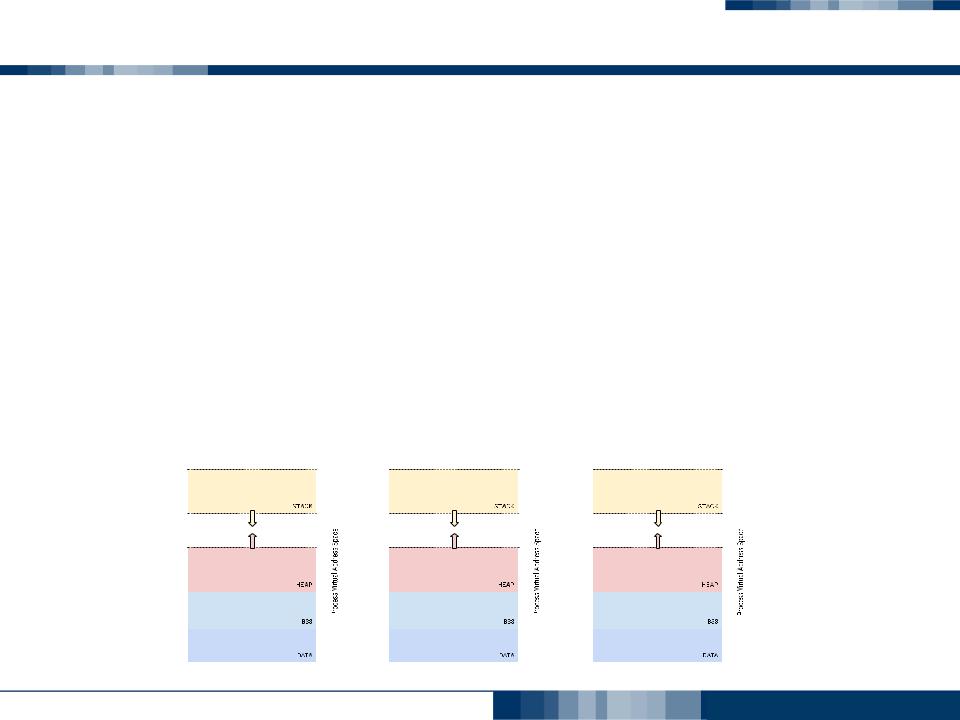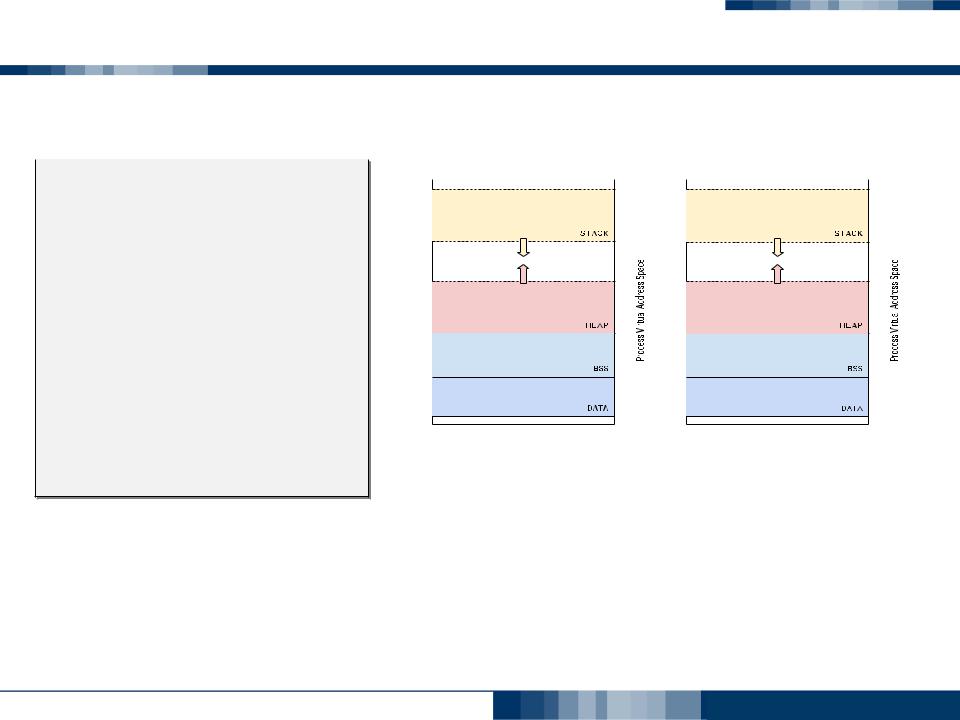
aos201617_multiprocess_programming_updated20161223
.pdf
Multi-Process Programming in C
Advanced Operating Systems (2016/2017)
Giuseppe Massari
giuseppe.massari@polimi.it

Outline |
2/50 |
Multi-process programming
Fork processes
Inter-process synchronization
Executing other programs
Inter-Process Communication
Signals
Pipes
Shared memory
Synchronization
Giuseppe Massari |
Advanced Operating Systems |

Multi-process programming |
3/50 |
Why multi-process programming?
Multi-process means that each task has its own address space
More task isolation and independence compared to multi-threading
Useful choice for multi-tasking application where tasks have significant requirements in terms of resources
Tasks requiring “long” processing times
Tasks processing big data structures
Tasks featuring high I/O activity (networking, disk accesses, …)
Task 1 |
|
Task 2 |
|
Task 3 |
|
|
|
|
|
|
|
|
|
|
|
|
|
|
|
|
|
|
|
|
|
|
|
|
|
Giuseppe Massari |
Advanced Operating Systems |

Multi-process programming |
4/50 |
Example 1: Forking a process
#include <stdio.h> #include <sys/types.h> #include <unistd.h>
int main () { pid_t child_pid;
printf("Main process id = %d (parent PID = %d)\n", (int) getpid(), (int) getppid());
child_pid = fork(); if (child_pid != 0)
printf("Parent: child's process id = %d\n", child_pid);
else
printf("Child: my process id = %d\n", (int) getpid()); return 0;
}
fork() creates a new process duplicating the calling process
Giuseppe Massari |
Advanced Operating Systems |

Multi-process programming |
5/50 |
Example 1: Forking a process
$ gcc example1.c o fork_ex1 $ ./fork_ex1
Main process id = 9075 (parent PID = 32146)
Parent: child's process id = 9076
Child: my process id = 9076
The main process has PID = 9075. It's parent (PID=32146) is the shell (echo $$) from which the executable has been started
After the fork() the program concurrently executes two processes
The child_pid variable, in the address space of the parent process, is set to the return value of the fork (the child process ID)
The child_pid variable, in the address space of the child process, is not set
The getpid() returns the current process identifying number
Giuseppe Massari |
Advanced Operating Systems |

Multi-process programming |
6/50 |
Example 1: Forking a process
|
|
|
9075 |
9076 |
||
|
int main () |
|||||
|
child_pid = 9076 |
|
child_pid = 0 |
|||
|
{ |
|
|
|
|
|
pid_t child_pid;
…
child_pid = fork();
…
}
Parent process virtual address space is replicated in the child
Including the states of variables, mutexes, condition variables, POSIX objects
The child inherits copies of the parent's set of open file descriptors
As well as status flags and current file offset
Giuseppe Massari |
Advanced Operating Systems |

Multi-process programming |
7/50 |
Example 2a
Two processes writing something to the standard output
#include <sys/wait.h> #include <unistd.h> #include <stdio.h>
void char_at_a_time( const char * str ) {
while( *str!= '\0' ) { |
|
putchar( *str++ ); |
// Write a char and increment the pointer |
fflush( stdout ); |
// Print out immediately (no buffering) |
usleep(50); |
|
} |
|
} |
|
int main() { |
|
if( fork() == 0 ) |
|
char_at_a_time( "............." ); else
char_at_a_time( "|||||||||||||" );
}
Giuseppe Massari |
Advanced Operating Systems |

Multi-process programming |
8/50 |
Example 2a
$ gcc forkme_sync1.cpp o forkme $ ./forkme
|.|.|.|.|.|.|..||..|.|.|.|
Concurrency leads to unpredictable processes execution order
The application might need to synchronize the execution of two or more processes
The parent process might need to wait for a child process to finish
The parent process forks a child process to perform a computation, goes on in parallel, and then it reaches an execution point where it needs to use the output data of the child process
Considering our example, assume this is the output we want:

 .............|||||||||||||
.............|||||||||||||
Giuseppe Massari |
Advanced Operating Systems |

Multi-process programming |
9/50 |
Example 2b: Forking a process with synchronization
The results can be obtained by exploiting wait(...) functions
#include <sys/wait.h>
#include <unistd.h> #include <stdio.h>
void char_at_a_time( const char * str ) {
while( *str!= '\0' ) { |
|
putchar( *str++ ); |
// Write a char and increment the pointer |
fflush( stdout ); |
// Print out immediately (no buffering) |
usleep(50); |
|
} |
|
} |
|
int main() { |
|
if( fork() == 0 ) |
|
char_at_a_time( "............." ); else {
wait( NULL );
char_at_a_time( "|||||||||||||" );
}
Giuseppe Massari |
Advanced Operating Systems |

Multi-process programming |
10/50 |
Synchronization using wait()
The parent process block itself until a status change has occurred in one of the child processes
Child process terminated or stopped
Child process resumed by a signal (see later)
The status is retrieved from an integer argument passed by pointer
pid_t wait(int * status)
The waitpid(pid_t,…) call allows the caller process to wait for
a specific child process
The wait/waitpid calls allow the system to release the resources associated with the child process
(e.g., opened files, allocated memory, etc...)
Giuseppe Massari |
Advanced Operating Systems |
